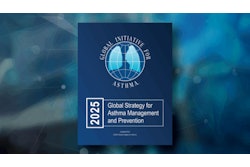
Chinese researchers have identified a powerful predictor of short- and medium-term mortality in asthma patients admitted to intensive care units (ICUs), potentially transforming how clinicians assess risk in severe cases.
The composite biomarker, known as the Endothelial Activation and Stress Index (EASIX), is derived from routine blood tests and can accurately predict 28-day and 60-day mortality in hospitalized asthma patients. The findings are from the new study, “Endothelial Activation and Stress Index for Prediction of Mortality in Asthma,” published in theJuly issue of Frontiers.
Researchers studied more than 3,700 patients in the MIMIC-IV database and suggested that EASIX could become a vital tool for early risk stratification in critical care settings. MIMIC-IV contains de-identified electronic health records (EHRs) from patients admitted to Beth Israel Deaconess Medical Center in Boston.
EASIX is calculated using three common lab values: lactate dehydrogenase (LDH), serum creatinine and platelet count. Originally developed to monitor endothelial injury in hematologic conditions, this study is the first to apply EASIX to asthma prognosis.
Key findings from the study include:
- Higher EASIX scores were independently associated with increased mortality at both 28 days (HR = 1.14) and 60 days (HR = 1.13).
- Patients in the highest EASIX tertile had nearly double the risk of death compared to those in the lowest tertile.
- The predictive accuracy of EASIX was high, with area under the curve (AUC) values of 0.892 (28-day) and 0.881 (60-day) in receiver operating characteristic (ROC) curve analysis.
- The relationship between EASIX and mortality was linear and consistent across subgroups, though lymphocyte levels appeared to influence outcomes.
According to researchers, the clinical implications for this study suggest that EASIX could serve as a simple, cost-effective biomarker to identify high-risk asthma patients early in their ICU stay. It may also help guide treatment decisions, especially in patients with abnormal immune profiles.
Upon recommending further validation in larger, multicenter cohorts and the exploration of EASIX in combination with other immune markers, researchers also proposed investigating whether therapies targeting endothelial-immune interactions could improve survival in high-risk asthma patients.





















